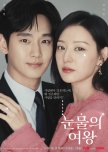This review may contain spoilers
Queen of Tears becomes King of Makjang. Beautiful to look at, dull and exhausting to actually watch
Major, MAJOR disappointment. The acting and cinematography were stellar 10/10, as expected of the budget and cast.
But the story nosedived incredibly starkly when the drama started focusing less on the characters and more on piling increasingly unbelievable trope conflicts one after the other. One of the main leads has a a terminal brain tumor diagnosis and somehow it's not even in the top 5 most deadly things they have to go through in the latter half of the episodes.
The two villains, in particular the 'second male lead', dial up the makjang factor to eleven and his plotlines take centre stage for far too long. My short summary of each block of writing -
Episode 1-4 = Great acting, interesting and unique storyline - even if it wasn't a masterpiece yet, it was at the least intriguing. The leads had a dynamic very seldom seen in Korean dramas, let alone of a drama of this scale.
Episode 5-8 = Incredible, this is the stretch of the episodes that suckered me in. At their best worst enthralling, at their best emotionally devastating, this was the peak of the series.
Episode 9-12 = A fairly balanced mish mash of light and dark tones, the makjang kdrama tropes nonetheless start to intrude upon. Newfound complications start slipping in from the rafters but the central focus of the story still remains. The Queens Group story is still so boring, it takes a Herculean effort to not fast forward through all of the corporate nonsense that unfortunately overstays its welcome.
Episode 13-16 = WTF. How many times do the leads have to have tearful hugs two minutes removed from some unhinged assassination attempt in the middle of suburban Korea and Germany. Character development gets replaced by exploding cars, poorly written villains get more dialogue and screentime than the main characters.
A colossal letdown shouldered by excellent performances. A Big Mac served on a silver platter. If there is anything to take away from Queen of Tears, it is that believable tears can not mask an unbelievable story.
But the story nosedived incredibly starkly when the drama started focusing less on the characters and more on piling increasingly unbelievable trope conflicts one after the other. One of the main leads has a a terminal brain tumor diagnosis and somehow it's not even in the top 5 most deadly things they have to go through in the latter half of the episodes.
The two villains, in particular the 'second male lead', dial up the makjang factor to eleven and his plotlines take centre stage for far too long. My short summary of each block of writing -
Episode 1-4 = Great acting, interesting and unique storyline - even if it wasn't a masterpiece yet, it was at the least intriguing. The leads had a dynamic very seldom seen in Korean dramas, let alone of a drama of this scale.
Episode 5-8 = Incredible, this is the stretch of the episodes that suckered me in. At their best worst enthralling, at their best emotionally devastating, this was the peak of the series.
Episode 9-12 = A fairly balanced mish mash of light and dark tones, the makjang kdrama tropes nonetheless start to intrude upon. Newfound complications start slipping in from the rafters but the central focus of the story still remains. The Queens Group story is still so boring, it takes a Herculean effort to not fast forward through all of the corporate nonsense that unfortunately overstays its welcome.
Episode 13-16 = WTF. How many times do the leads have to have tearful hugs two minutes removed from some unhinged assassination attempt in the middle of suburban Korea and Germany. Character development gets replaced by exploding cars, poorly written villains get more dialogue and screentime than the main characters.
A colossal letdown shouldered by excellent performances. A Big Mac served on a silver platter. If there is anything to take away from Queen of Tears, it is that believable tears can not mask an unbelievable story.
Was this review helpful to you?



